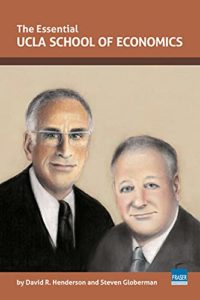"You tell me the rules and I'll tell you what outcomes to expect."
By Amy Willis
We hear a lot about the Chicago and Austrian schools of economics, but what about the UCLA school? In this episode, EconTalk host Russ Roberts welcomes EconLog’s David Henderson, who recently co-authored The Essential UCLA School of Economics with Steven Globerman. The theme of the conversation might as well be, as the title above suggests, Armen Alchian‘s famous dictum about understanding the role of incentives in economics and in everyday life.

The Economic Way of Thinking dominates our approach here at Econlib, and this conversation is a great example of applying it to puzzles we see in the world. Let’s hear what surprised and (hopefully!) delighted you about this exploration. Please share your thoughts in the comments below. You might also try some of these questions out on your friends, and start your own conversation offline.
1- The conversation begins with a discussion of Harold Demsetz‘s 1967 AER article on property rights. Roberts and Henderson agree that this piece would both never be published in a top journal today, and that it remains a path-breaking contribution. What was so significant about this article? How do you think Demsetz’s notion of mutually beneficial exchange compares to the notion of euvoluntary exchange as put forth by Mike Munger?
2- The conversation turns next to the theory of the firm and another AER article, this one-co-authored by Demsetz and Alchian. How does the theory of the firm emphasize the importance of a residual claimant? How can this theory help to understand how a team’s productivity can be measured?
3- What is the Nirvana Fallacy? How does Roberts push back regarding the role of government in correcting market failures? To what extent do you think Roberts’s push back is appropriate? Explain.
4- The conversation turn to the work of Jack Hirshleifer, particularly on Disaster and Recovery. What is the most important thing one should understand about that work, according to Henderson? How does Roberts suggest this lesson might apply to our experience with the COVID pandemic?
5- The conversation returns to Armen Alchian and his 1950 paper on profit maximization. Henderson describes Alchian’s position by saying, “firms don’t know enough to maximize profits.” What does this mean? What is the nature of Roberts’ caution about assuming people act as if they maximize utility?
Bonus Question: Which economic “puzzle” (and corresponding “solution”) most surprised you, and why?
